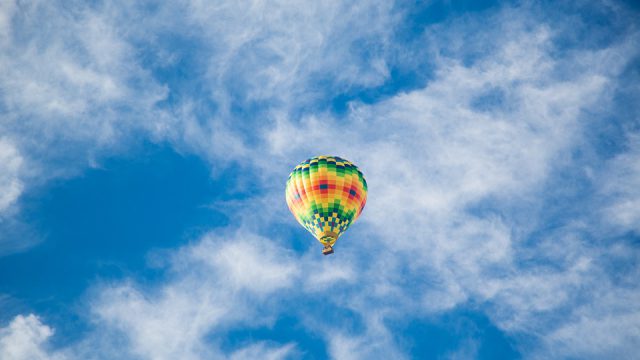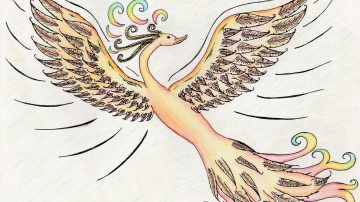There was not a spare chair to be found as we gathered at the Victoria Centre for this exciting event. Many people gathered to learn about the science of wellbeing, with the promise of inventing our own experiments as part of the evening.
The evening was led by Caroline Wood from the British Science Association. She introduced us to the programme, explaining that we would have the chance to “speed date” four out of the six areas being presented by research students from the University of Sheffield. There followed a breakneck tour of the science of wellbeing in four ten minute slots.
I chose to visit the Creativity, Exercise, Storytelling and Nature tables. There were also tables for Food and Mood and Mindfulness.
Creative Activities
First stop was Creative Activities. We learned a surprising amount in a short time, from the benefits of knitting to the health outcomes of window box gardening. For example, the provision of visual and performance art in hospitals helps to reduce patients’ need for pain relief and leads to earlier discharge. Those who engage in it have reduced stress levels and better vital signs than those who don’t.
Why? Because focusing on one thing completely is good for us. We become absorbed in enjoyable activities and this causes a positive upward spiral in emotion. Enjoyment and anticipation combine to produce happy chemicals in our brains, especially cortisol which is good for reducing anxiety. Music therapy, for example, is more effective than taking medication for anxiety. Growing plants is a good feel-good activity, partly due to the physical exertion and partly because it gives us a sense of responsibility and connection to nature. It’s also good for venting frustration and anger. Having house plants clears the air and promotes better breathing, reducing fatigue and headaches. Dancing, colouring, and making collage all help us to engage with activity and the community.
Exercise
Next on my whistle stop tour was Exercise. We learned about meta analysis which is when the findings of many similar experiments are combined to obtain more compelling evidence. For example, 35 trials for depression showed a moderate clinical effect for exercise, meaning that exercise makes a good deal of improvement to people’s levels of depression. Seven trials compared exercise to counselling and four to medication as therapies for depression and found all three to be equally beneficial. In tests where exercise was compared to being given a placebo the exercise produced a 40-50% improvement whereas the placebo takers improved by 30%. Similar results have been found for the benefits of exercise for anxiety
Why? This is likely due to the release of chemicals when we exercise. Endorphins, as well as making us feel good, help the brain to grow parts it has been missing as, for example, in depression certain cells die off. Exercise also produces endocannabinoids which are the brain’s reward system. Exercise also has analgesic effects, reducing pain and anxiety, and promoting wellbeing.
The Government recommends we do 2.5 hours moderate exercise per week, such as a half hour of brisk walking five times a week. The benefit can be compounded by other things like being in nature. If you want to increase your level of exercise it’s a good idea to talk to your GP about resources for getting more healthy.
Storytelling
Next up was Storytelling. This is all about life stories. These might be about family, work, community or difficult times. Telling our stories helps us to form connections. It triggers parts of the brain that relate to our words, for example, talking about ice cream triggers the parts of the brain that deal with eating ice cream. We might tell our stories through books, videos, diaries, audio recordings, or even just by thinking about them. This helps us to reflect, externalise and organize our thoughts. It improves communication skills.
Why? Writing about goals makes us more productive. Talking about how our work makes a difference makes us more committed to it. A group of engineers wrote how they felt about losing their jobs and felt less angry and had a much better reemployment rate as a consequence. When they were re-evaluated 52% of them had gained employment while only 19% of those who didn’t write were newly employed. One study had people writing emotional stories for 10 minutes every four days. Their self esteem increased and they felt decreased pain when talking about their difficult experiences afterwards. Storytelling also improves the immune system. For example, in HIV patients, doing writing for 30 minutes four times a day decreased their viral loads immediately after writing but they increased later. When HIV patients wrote specifically emotional stories, though, the drop in their viral load was sustained.
Poetry is a good way to process events. Voice and video recording works too, with the same benefits. Reading or listening to other people’s stories for 6 mins a day can reduce stress by 68%!
Nature
My last stop was at the Nature table. Nature includes anything from mountains to parks to houseplants. Watching a Nature documentary can increase calm. When inmates watched a nature documentary each day, violence in the prison decreased by 26%. Five minutes in nature is enough to reduce stress physiologically, such as heart rate, blood pressure and breathing rate.
Spending more time in bright light increases serotonin. Nature enables the mind to recover and restore itself. It improves concentration and memory. This is explained by the attention restoration theory. Many activities need directive attention where we must focus our minds on them, such as walking in a busy city centre. Nature diffuses our attention giving our minds a chance to restore. One experiment gave people a long series of numbers to remember and then recite backwards. Half of them went to a park and half walked in the city. The working memory scores of those who went to the park improved but those who went to the city didn’t. Those who exercise outdoors tend to have better mental health than those exercising inside. Even looking at a picture of nature can help.
Food
After this great outpouring of information we had a well-deserved break during which mood enhancing food and drink were served. On the menu were salad, beans, mackerel, hummus, raw peppers, carrots and celery, cottage cheese, pitta, quiche and some delicious cakes, among other things.
Inventing Experiments
We then moved on to the section during which we could invent our own experiments! Caroline gave us some pointers on things to bear in mind.
First we need a hypothesis, something we believe is true but for which we have no evidence yet. Our experiment is designed to find the evidence. We were advised to be specific about the details of our experiments: what, when, how long for, and to keep everything else constant. We also need to think about how to measure our wellbeing, for example by using a wellbeing survey. We can test physical symptoms like our temperature and blood pressure, and involve friends and family in rating our mood. Before beginning the experiments we need to establish a baseline of how we are normally. This will give us data to compare with the results of the experiment. We also need to plan a system for recording our observations and were each given a lab book. Relationships also have an impact on wellbeing so we were advised to consider doing our experiment with others.
I returned to the exercise table as I want to do an experiment about dancing. I want to see whether dancing to music for 10 minutes each day will have a noticeable impact on my wellbeing. Other experimenters are going to build up time running for 3 times a week in preparation for a 10K obstacle course, see whether swimming 2-3 times a week improves sleep, and test out the impact of going to the gym on wellbeing. I’d be very interested to know what those on other tables decided to do. Please leave a comment if you were there.
The next Flourish event on 30 October will be a chance for us all to meet again to share the results of our experiments. Watch this space!



